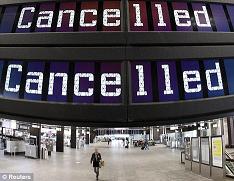Blanket Cancellations of Flights and Airport Closures: Reacting to Iceland’s Volcanic Eruption

Plane operators are up in arms, which is just about right, since they can barely get their machines off the ground. Blanket cancellations of flights and airport closures made in response to the explosion of Iceland’s Eyjafjallajökull volcano continue to pressure airlines and passengers alike. The executive boards of the major flying outfits are mustering their forces in an effort to change the minds of air traffic authorities across Europe. Action is being taken to fly passengers back to their destinations of origin. Have authorities overreacted in their nanny-state concerns, keen to avoid catastrophe over the skies of Europe?
Patrick Smith at Salon.com is sympathetic (Apr 20) to the authorities, and he is, himself, a pilot. Natural events of such nature affecting twenty sovereign states, he surmises, are bound to cause ‘logistical disorientation.’ Naturally, the fliers of the world are seen as the modern ecological parasites, transported in polluting machines that drive up the carbon metre. The environmentalists are chortling at this event: nature is having its revenge over human frailty. The question remains whether the airlines have a legitimate point in questioning the judgment of airport authorities.
Deutsche Lufthansa AG and Air France-KLM have taken their own initiative to man flights free of passengers, desperately finding the evidentiary clout that will get their planes off the ground. KLM can count up to 10 flights at normal flying altitude with no damage. Information is duly being processed and being relayed to various relevant transport authorities. The devil, according to some of the flight companies, lies in the science. ‘The decision to close the airspace was made exclusively as a result of data from a computer simulation at the Volcanic Advisory Centre in London,’ noted a visibly frustrated Hans-Christoph Noack of Lufthansa and Air Berlin PLC (WSJ, Apr 18). Data has been skimpy. Among other things, no weather balloons were deployed to conduct measurements about the presence of volcanic ash in the air.
The financial losses are set to be colossal, pummelling an industry already weakened by financial woe. Airlines such as Finnair have projected their losses at $2.7 million a day, while Emirates Airline is losing amounts around $10 million. Other carriers are yet to release a public estimate of loss.
Caution is still the watchword of such bodies as the United Kingdom’s traffic control agency, NATS. Forecasts from the Met office are being digested, and restrictions are set to remain in place in some form. Reassessments have to be constantly made depending on volcanic activity and cloud drift. Plummeting planes will take place on their watch, and they are taking few chances. And it is difficult to question that judgment, given the current state of affairs. Had Europe’s airspace been dominated by falling flights and numerous body bags, the criticism would have been of a quite different order.
The science on this matter, for what it’s worth, is clear: that volcanic ash can congeal in engines to halt them. We have seen a few instances of this – the 1982 British Airways Boeing 747 and again, one with a KLM Boeing 747 in 1989 over Alaska. On both occasions, passengers and crew were lucky to escape with their lives. Criticisms about measuring such ash will be shown to be worthy only if it can be demonstrated that the authorities did not do all they could to test and measure what was (and is) present in the atmosphere. Mere computer simulations may not be a sound enough pretext to cause global cessations in airline traffic.
Headaches as to how reimbursements will be made, and how the airlines themselves will be compensated, are gathering pace. Searching questions will have to be asked whether tickets costing a hundred dollars a piece will require compensation in the thousands.
The final decision to lift the flying ban rests with national authorities. A failure to coordinate that venture will cause further chaos. But as one post on the Salon website muses, inconvenience might be preferable to death. Human beings will simply continue doing what they have always done: scratch their heads at the crippling wonders of natural events.
Binoy Kampmark was a Commonwealth Scholar at Selwyn College, Cambridge. He lectures at RMIT University, Melbourne. Email: [email protected]

